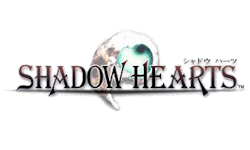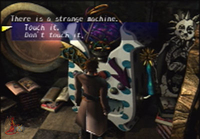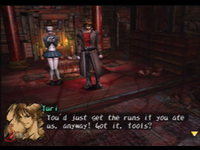|
|

|
PLATFORM
|
PS2
|
BATTLE SYSTEM
|

|
INTERACTION
|

|
ORIGINALITY
|

|
STORY
|

|
MUSIC & SOUND
|

|
VISUALS
|

|
CHALLENGE
|
Moderate
|
COMPLETION TIME
|
20-40 Hours
|
|
OVERALL

|
+ Addictive Judgment Ring
+ Unique setting
+ Compelling music
- Annoying Malice quashing
- Small, cramped locations
|
Click here for scoring definitions
|
|
|
Koudelka didn't exactly win tons of critical praise or massive sales, so it receiving a follow-up in the form of Shadow Hearts was quite a surprise. For that follow-up to be localized by Midway, a company associated with a plethora of arcade action titles but not much in the RPG world, makes the surprise even more pronounced. Shadow Hearts proceeded to not set sales charts afire, which was anything but surprising when it was released very close to Final Fantasy X. It's a testament to how interesting the game is that the multitude of stories surrounding its release are less captivating than the title itself, though it's not an unqualified success.
The first glance at Shadow Hearts' seemingly turn-based combat finds that it contains a sizable action element in the form of the Judgment Ring. When choosing any action in battle, a ring reminiscent of a clock face appears on the screen, and a clock's hand circles it once. The player must hit X every time the hand passes through a colored part of the ring in order to successfully accomplish an action, whether it be using any item or launching the standard three-hit combo every character uses for a regular attack. Doing well makes the action come off successfully, attempting to hit small slices of the action zones increases their effectiveness by twenty percent, and missing at any time stops the character's turn. It is possible to make a regular attack succeed partially by only hitting one or two of the potential three hits, but any other action will fail completely with a miss on the Judgment Ring. A tiny bit of practice is enough to make the system understood, and using it well will keep battles from being very challenging.
It may sound exacting, but the Judgment Ring is actually a superb method of keeping combat interesting. Performing well will make regular foes fall rather quickly, and needing to perform well adds an extra element of tension to boss encounters. Combat otherwise is fairly standard, save for the bizarre nature of many enemies in the random battles and how they affect character sanity. Fighting is quick and effective but mostly unremarkable save for the Judgment Ring's presence, which makes encounters considerably more involving. The frequently-bizarre enemies affect the action through Sanity Points, which decrease steadily and make characters go insane for the rest of the battle once they're gone; regular fights don't last long enough to make them an issue, while they make fighting bosses rather tense.
The Judgment Ring intrudes elsewhere in the game, making the simple act of shopping much more involving than usual. The player obtains cards as the game progresses which provide a chance to apply the Judgment Ring towards altering the prices of merchants, an addictive pastime that makes commerce much more interesting. A few times the Judgment Ring also appears during events to progress the story, and serves as an interesting change of pace once more — though the occasional moments when rapid hammering of the X button is necessary could have been removed. Shopping and navigation are otherwise undistinguished save for the ability to expensively increase weapon parameters by a lower amount than the next iteration offers, making the Judgment Ring's inclusion quite welcome.
 Even modern vending machines don't pop out high-quality weapons. More's the pity.
Even modern vending machines don't pop out high-quality weapons. More's the pity.
|
|
Shadow Hearts has a narrative that dips into the alternate history well in order to depict a number of events from 1913. It begins with a young woman by the name of Alice being removed from a Japanese military train in Manchuria, then continues to show how a Chinese mystical madman wants her special powers to unleash horrific forces of destruction in the Shanghai area. Alice's rescuer is an uncouth man named Yuri who possesses the unique ability to change into demons he has forced into submission. Possession of such a skill did not come to Yuri without cost, and his inner demons constantly threaten to be his undoing.
Novelty helps a lot with the narrative in Shadow Hearts, and the slightly off-kilter version of 1913 Earth it depicts is definitely memorable. Attempts to infuse the cast with distinctive characters are mostly successful, but the tale as a whole has a fair number of holes, and its Asian and European halves don't link very much. There are some goofy moments sprinkled among the mostly straight-faced tale, meaning the game doesn't play around with its alternate version of 1913 as much as it could. Midway did a solid job with the localization at least, coming up with text that flows well.
Every town with a real life counterpart is much smaller in Shadow Hearts, often amounting to just two or three screens with a like number of buildings that can be entered. Accepting the game's representation of such familiar locales as Prague and Shanghai is much more difficult when barely anything can be done in them. Dungeons frequently aren't much better, feeling rather short and small for the most part. The game as a whole can be finished in not much more than twenty hours, and the brevity of most of its locations is one reason why.
Having short dungeons turns out to be a blessing in disguise thanks to the need for Yuri to abate Malice, however. For reasons of plot, the creatures he kills gradually empower a sinister force lurking in his own mind. Letting Malice rise to its maximum level will summon a very nasty enemy that will most likely grant the player a Game Over screen. The usual brevity of the dungeons is very helpful for dealing with this condition, as Yuri can only enter the graveyard in his own mind from a save point. The novelty of tamping Malice growth is interesting at first, but the need to fight an otherwise-pointless battle repeatedly gets monotonous. Later in the game means of avoiding Malice accrual become possible, but dealing with it is never a joyful occasion.
 Something in either Yuri or Alice must have a laxative effect, then. Perhaps it's best not to know what.
Something in either Yuri or Alice must have a laxative effect, then. Perhaps it's best not to know what.
|
|
Instead of a constantly-accessible arsenal of special abilities like other characters, Yuri can fuse into a variety of creatures that are then capable of using unique skills. He can only have three of them equipped for battle at any time, which is bothersome when the available options become greater. Acquiring the demons in the first place is partly a matter of luck, for the party must kill enemies corresponding with the right element, after which Yuri must enter his head's graveyard to best the intended servant in a duel. At least getting the fusion demons is mostly straightforward, since most other side quests in Shadow Hearts require a lot of time wandering around with no prior clues to uncover.
Shadow Hearts is definitely a step up from Koudelka in its visuals, but looks more like a high-quality PS1 title than what the PS2 was already capable of producing. Environments are the rigid maps so common to the PS1's library, though finding their exits is much easier than in many games that look similar from earlier years. The visuals are understandable given that this game was released early in the PS2's life, but they still pale compared to what Squaresoft was turning out concurrently.
The music of Shadow Hearts is extremely varied considering the game's length, and much of it quite memorable. Most of the compositions are either brooding or somewhat disturbing, which fits the atmosphere quite well. The vast majority of the game's story is text only, but occasionally a lengthy scene will pop up that features voice acting. The actors mostly do adequate work, but judging the performances is rather difficult when they occur so seldom. Meanwhile Midway skimped on battle vocals, leaving most of them in Japanese to further complicate consideration of the audio.
Its bad fortune to come out near Final Fantasy X's release almost killed this series, but it got another chance several years later. Another chance is just what it needed, since Shadow Hearts contains quite a few obtuse and frustrating parts to go along with the great idea of the Judgment Ring — and Shadow Hearts: Covenant would soon get the chance to do that. It's more entertaining than its predecessor, Koudelka, but isn't a must-play.
Review Archives
|









